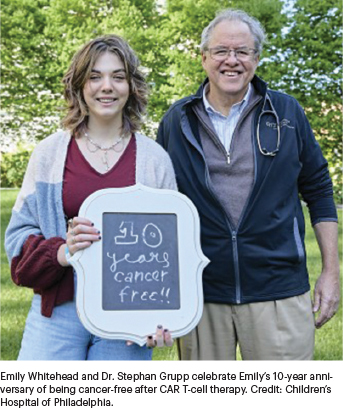Tom and Kari Whitehead came to Children’s Hospital of Philadelphia (CHOP) 10 years ago looking for a miracle. Their 6-year-old daughter, Emily, had relapsed in her battle with acute lymphoblastic leukemia (ALL), after many months of unsuccessful chemotherapy and a disease that had progressed so rapidly that she was ineligible for a bone marrow transplant to treat it. Her local medical team had told her family there was nothing left to do but bring Emily home and allow her to die peacefully.
Unwilling to accept this outcome, her family came to CHOP in the hopes that Stephan Grupp, MD, PhD, a pioneer in the field of cellular immunotherapy, could provide the miracle they were looking for. Dr. Grupp had been working in close collaboration with researchers at Penn Medicine’s Abramson Cancer Center to establish a protocol to infuse, for the first time in children, a new chimeric antigen receptor (CAR) T-cell therapy product targeted against leukemia.
Dr. Grupp and the research team were about to open the first phase I trial for CAR T-cell therapy in pediatric patients with ALL, based on early success Penn scientists had already seen in three adult patients with chronic lymphocytic leukemia. Emily became the first patient to enroll in the new trial, and 10 years later, Emily is cancer-free.

Surpassing Expectations
“What we learned from Emily has defined the entire field of CAR T-cell therapy,” said Dr. Grupp, Section Chief of the Cellular Therapy and Transplant Section, and Inaugural Director of the Susan S. and Stephen P. Kelly Center for Cancer Immunotherapy at Children’s Hospital of Philadelphia.
“Ten years ago, we had no idea what to expect. Would the treatment work? Would it last? In the end, her outcomes far exceeded our most optimistic expectations—not only did the treatment work for completely uncontrolled disease, but her engineered T cells endured and prevented relapse for what has now been 10 years. We have since treated more than 440 patients at CHOP with this therapy, and thousands of pediatric patients around the world have received it as well. It has truly been a revolution in pediatric cancer care, and it started with Emily.”
On August 30, 2017, 5 years after Emily was treated, the U.S. Food and Drug Administration (FDA) approved the CAR T-cell therapy, now called tisagenlecleucel. It was the first CAR T-cell treatment in the world, as well as the first gene therapy in the United States, and this new field of medicine began with its approval for pediatric ALL. Since then, the FDA has approved a total of six CAR T-cell therapies, for conditions ranging from diffuse large B-cell lymphoma to multiple myeloma.
Sharing the Miracle
Emily is now almost 17 and a junior in high school. Soon, she will take the SATs and begin drafting essays for college applications. Eventually, she’d like to pursue a career in film or environmental science.
Given their experience with CAR T-cell therapy at CHOP, the Whitehead family started the Emily Whitehead Foundation in 2015 to help more families by funding the most promising cutting-edge cancer research, including CAR T-cell therapy and other immunotherapies. Now in its eighth year, the foundation has supported numerous cancer researchers, including those at CHOP.

